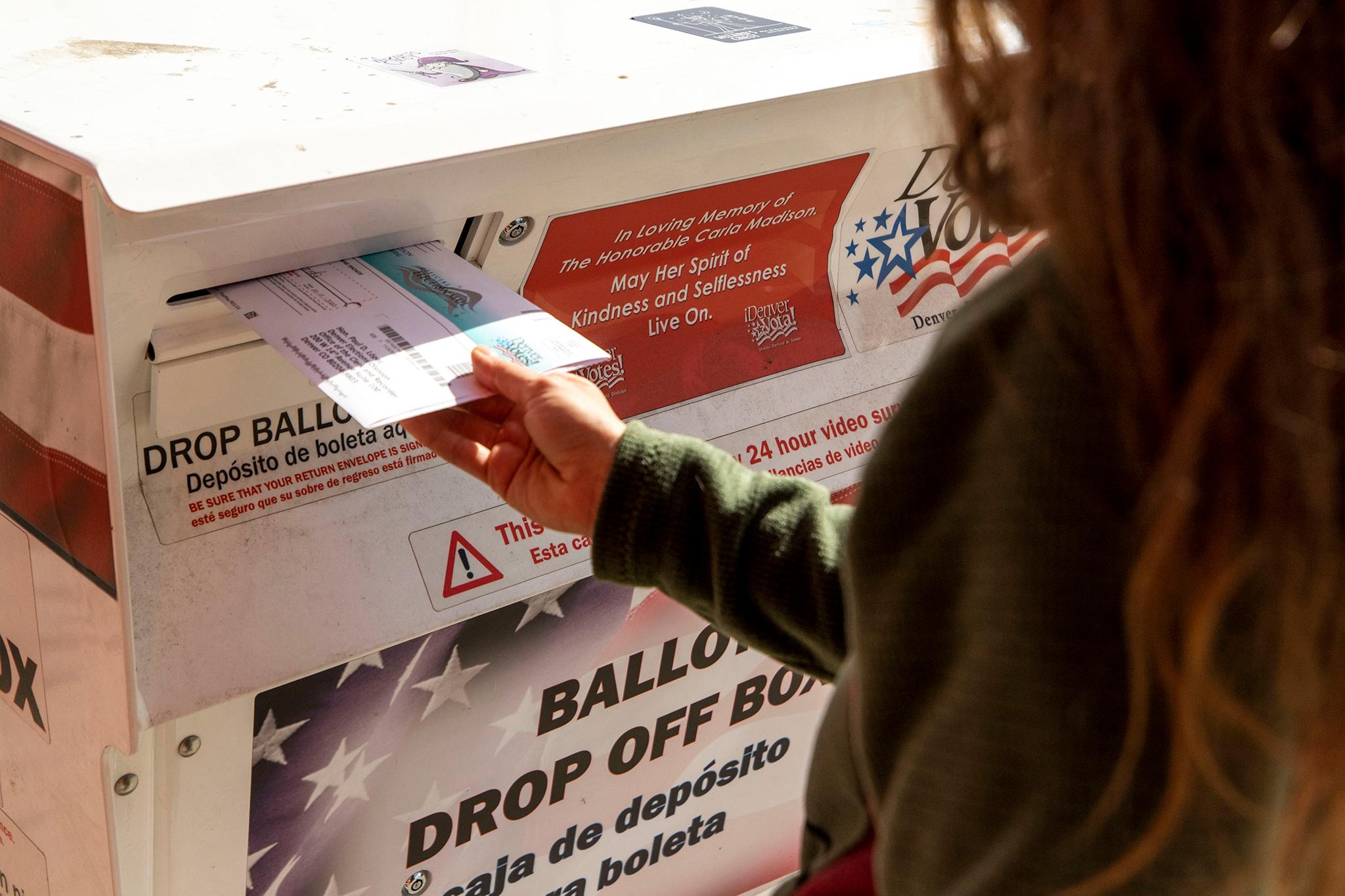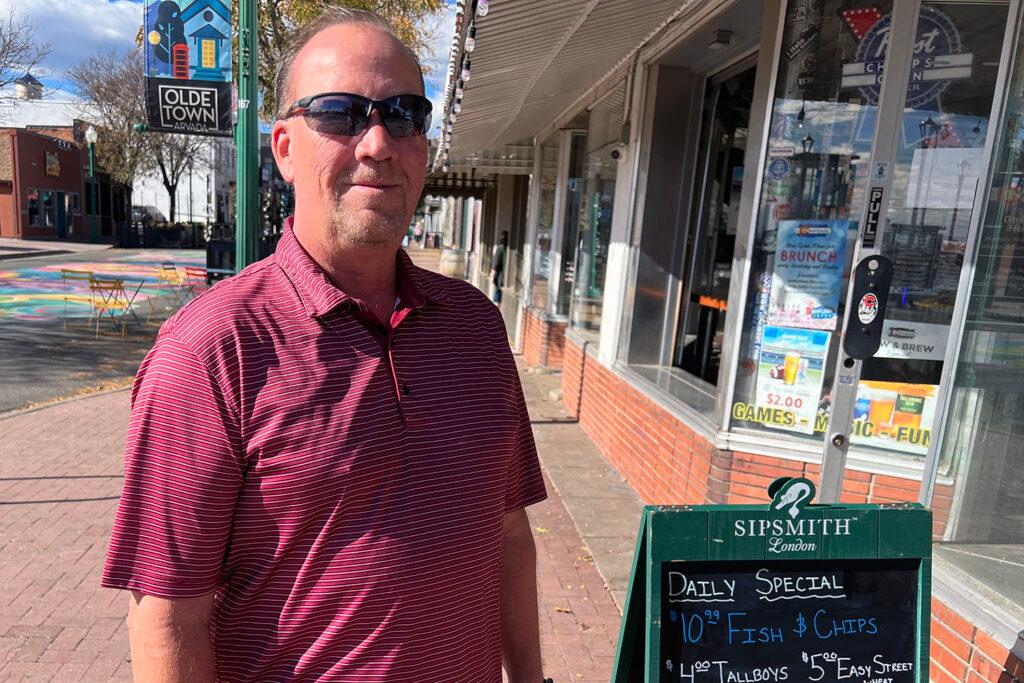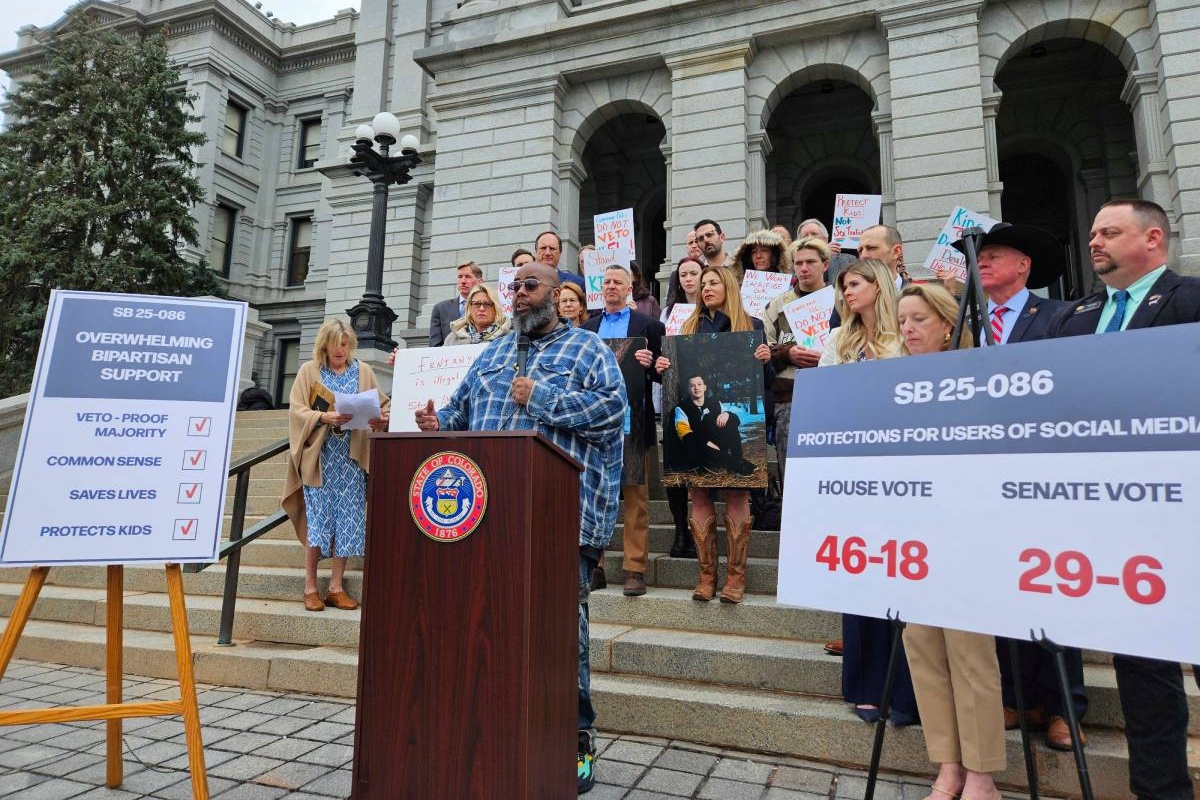
Voters in Colorado had a lot of homework this fall.
While there were only two items on the statewide ballot, one of them was Proposition HH — a sprawling tax reform package that has once again forced countless Coloradans to become armchair fiscal experts.
“It’s harder than algebra was,” quipped Kathy Sullivan, a 70-year-old unaffiliated voter from Adams County. That was a common sentiment on Friday afternoon in Olde Town Arvada, where no two voters seemed to have the same understanding or rationale about the Democratic proposal.
“I spent a considerable amount of time researching it, because I wanted to know all the ins and outs — and on the ballot, the way it’s worded is not always very clear,” said Linda Groomer, also 70.
In fact, the measure is one of the most complex ever to go before Colorado voters — and that’s because it was designed to accomplish two big goals at the same time.
Democrats have advertised Prop. HH primarily as a property tax cut that will save homeowners hundreds of dollars per year, which is true. But the measure also would loosen the legal limits that restrain Colorado’s government spending, eventually allowing the state to direct possibly billions more dollars to education instead of refunding them to taxpayers.
In interviews ahead of Election Day, voters told CPR News they had taken anywhere from a few moments to a few hours to decipher their ballots. The measure also has inspired fierce debates about the nuances of tax policy on Facebook, Reddit and the distant corners of the internet, not to mention the ads and canvassers from campaigns that have collectively raised more than $3 million in the fight over Prop. HH.
Some voters had a clear perspective on the measure. Groomer and Sullivan are both voting no, saying it doesn’t do enough to cut taxes. Others were drawn in by those property tax savings, saying they needed a break in a tough economy. Some delved deeper, saying they were opposing — or supporting — the measure because of its long-term changes to state spending limits.

But misinformation and misunderstandings about Prop. HH were prevalent too, including fears that it would actually raise property taxes, which is one thing it definitely doesn’t do. And some who hadn’t decided yet said they were dreading the task of figuring it all out.
That kind of confusion and backlash has many supporters of the measure worried that it will be defeated on Tuesday, joining the ever-expanding graveyard of unsuccessful tax reforms. And if Prop. HH goes down, it also would represent the second big defeat this year for Gov. Jared Polis, who earlier saw his land-use bill implode.
Success, meanwhile, would mean that Democrats have partially defused the political threat of rising property taxes, and perhaps blocked conservatives from passing their own property tax measure in 2024 — while also making major progress in the long liberal effort to reform the state’s tax system, with implications that could unfold over more than a decade.
How a 'property tax moment' became a TABOR reform bill
Property tax bills have been rising at historic rates because of sharp increases in property value. Next year’s jump is set to be especially large. Top Democrats say that Prop. HH is their response — a way to offer relief to property owners.
But some of the measure’s backers also saw an opportunity for a double play. Why not package the tax cut with another long-standing priority — securing additional funding for education, too?
“A lot of legislators, a lot of folks in the governor's office, have been really working on solutions to education funding for a very long time,” said Rep. Chris deGruy Kennedy, a Democrat who was involved in the initial planning of Prop. HH.
“This property tax moment came along, where we really needed to do something about it. Trying to find that solution where we could continue our efforts on funding education more robustly in Colorado while also delivering these property tax reductions to people was central to the entire conversation,” he said.
The measure was crafted largely behind closed doors this spring, with the governor's office negotiating with education groups, Democratic lawmakers, the business group Colorado Concern and others. Once the language was drafted, backers rushed it through the state Capitol in the final week of the legislative session — leading to harsh objections and even a lawsuit from Republicans who were largely excluded from the process.
The final result: Voters will decide Tuesday on a measure that lowers property taxes immediately — and also lets the state hold on to more of the other taxes people pay over the long term.
The tax cut part is simple enough. If Prop. HH is approved, property owners will pay local property taxes on a smaller portion of the value of their home or business property.
At the same time, though, the measure would change the rules for the larger tax system of the state government itself. It would raise the state spending limits created by TABOR, allowing the government to eventually keep hundreds of millions, and then billions, of dollars more tax money each year instead of refunding it.
Some of that refunded money would be used to make up for the effects of the property tax cuts on schools and cities. But over the years, the effects of the measure would go further and further, eventually adding up to a significant expansion of the government’s spending authority.
“After finally weeding through it, I think it would be pretty profound,” said Mark Cavanaugh, a political veteran of the long war over Colorado taxes.
Within a decade, if the economy remains on its current trajectory, Prop. HH would allow the state to keep an extra $2.2 billion per year — far more than it would need to pay for the property tax cuts. The extra retained money could instead be used as new funding for public schools.
The latest battle in a 30-year tax war
When voters approved the Taxpayer’s Bill of Rights in the early 1990s, they gave themselves extraordinary power over the government’s budget. The amendment says that voters have to give permission for any increase to tax rates or general government spending limits.
And for the 30 years since, reformers have been trying to convince voters to make those changes. Democrats and others have proposed a dozen measures that would either increase taxes or shrink refunds. It has not gone well for them.
In recent years, voters have rejected four different school funding measures, not to mention failed measures to fund transportation projects and even services for people with disabilities.
“There's been a long history, the vast majority of them unsuccessful, [of] attempts to adjust TABOR,” Cavanaugh said.
However, Prop. HH marks a new approach. Previous efforts focused on convincing voters to raise taxes so the state could pay for pressing needs.This time, the spending increase comes with a tax decrease.
Conservatives dismiss it as a bait-and-switch — get voters in the door with property tax relief, but then reduce their tax refunds over a decade or longer.
“It’s rigged. TABOR is gonna be eliminated and the taxes are going to go up,” said Rich Hansen, a 71-year-old Republican voter. “It’s a sham.”
Democrats object to that criticism. They argue that the changes to TABOR are being made partially in service of the property tax cuts. The refund money will be used first as “backfill,” ensuring that schools and some local governments are shielded from any losses of property tax dollars.
“Prop. HH is all about avoiding the most dire consequences that we know people will face if we don't do anything, if we simply allow the status quo to move forward, which will result in on average of 40 percent increase in property taxes across the state of Colorado,” said Senate President Steve Fenberg in a press conference.
But Democrats acknowledge that they’re also hoping the TABOR adjustments will deliver new tax revenue for schools.
“I don't think it's a secret. I don't think we're hiding anything that this is good for education,” Fenberg said.
The subtler “reform TABOR to support education” message has filtered through to some voters and won them over, especially with the help of education groups that are mobilizing to support the measure. The statewide teachers union recently announced that Prop. HH could mean “billions for public education over the next 10 years,” and education advocacy volunteers have made up the backbone of the door-to-door canvassing push for the measure.
Dan Moore, a 62-year-old unaffiliated voter, said he understood and liked the TABOR changes.
“I think we have taxes for a reason,” he said. “As long as they’re spent wisely, I don’t mind paying my taxes — I think TABOR has limited our ability to use some of the extra money as we’ve grown so much. ... I think this would be fine.”
However, the campaign’s focus on property taxes, rather than schools, may have left some potential support on the table.
“You just see the signs, and you think, ‘I don’t want to lose my tax refund,’” said Barb Kamlet, 74, of Aurora. When she eventually learned the reappropriated refund money could go to schools instead, she started to warm on Prop. HH
“I need to study more,” she sighed.
Complexity kills?
David Flaherty, who has been polling Colorado voters for decades, said that taking the public’s temperature on HH was a challenge like no other.
“It was probably the most complicated ballot measure we have ever attempted to measure opinions around, because there's a good 12 to 13 policies that will be kicked in by the approval of HH,” Flaherty said.
Besides the core tax changes, Prop. HH comes with numerous extras, such as an additional voluntary limit on local property tax increases; “portability” changes that will make it easier for seniors to get the homestead property tax exemption; the guarantee of equal TABOR refunds next year for all Coloradans; and more.
That’s making some supporters of the measure nervous — because when it comes to ballot measures, complexity can kill.
“I think it's a real uphill battle when you want to make these really substantial changes, and you can probably hear in my tone that I personally don't give the odds of HH being very good,” said Cavanaugh, who supports the measure.
Cavanaugh is speaking from experience. He was deputy campaign manager for Referendum C in 2005. By far the most substantial change to TABOR ever approved, Ref. C has since allowed the state to retain tens of billions of dollars in would-be refund money. But that measure was championed by a Republican governor and a bipartisan campaign in response to a looming fiscal crisis.
In contrast, Prop. HH has become a strictly partisan affair, with the campaigns on both sides reporting about $2.4 million in fundraising each. Republican opponents say they sense weakness in Prop. HH, and they recently renewed their calls for Polis to convene a special session to deal with property taxes instead.
“On Nov. 8, I want the governor to indicate to Coloradoans that he actually is going to work to help save them money and decrease their taxes, including property taxes and the income tax, and make the homestead exemption for seniors portable and increase the exemption amount,” said Republican Sen. Barbara Kirkmeyer, who’s working on the opposition effort.
What will voters ultimately decide?
Flaherty’s polling found that the top line message of property tax cuts was popular with a majority of respondents, but that support eroded as the pollster walked potential voters through the rest of the details. Republicans think they can defeat the measure if they can reach enough people.
The measure also faces entrenched opposition from local governments, who resent the state’s interference in their local tax base. And it’s even divided Democrats, with some younger progressives angered by its focus on tax relief for property owners.
“Democrats had to make the hard choices and offer something to the voters that we thought would balance those different prerogatives. But yeah, it is not bipartisan, that's for sure,” acknowledged deGruy Kennedy.
Still, supporters of Prop. HH have some reasons for optimism.
Despite all the rejections, TABOR reformers have had a couple tax successes in recent elections, especially as the state’s grown more liberal and Democrats have tried new strategies. Voters agreed to give up hundreds of millions of dollars of tax refunds to pay for affordable housing through Prop. 123 last year, and they also effectively raised taxes on the wealthy to pay for school lunches in the same year with Prop. FF.
This year's election will bring a different voter base, since it’s an “off year” without big-ticket political races.
So far, the voters returning ballots have been older and more conservative than the state as a whole. As of Friday, more than half of ballots returned came from voters 65 and older, and nearly 20,000 more Republicans had voted than Democrats. But older voters are more likely to benefit from the various property tax provisions — and Democrats are banking on their support.
“They’re the ones that are going to have a huge say in this,” Flaherty, the pollster, said of older homeowners.
And in these final hours, voters of all ages are still studying and scrambling, preparing to make a collective decision that could shape the state’s future for years to come. Election results will be released starting at 7 p.m. on Nov. 7.









